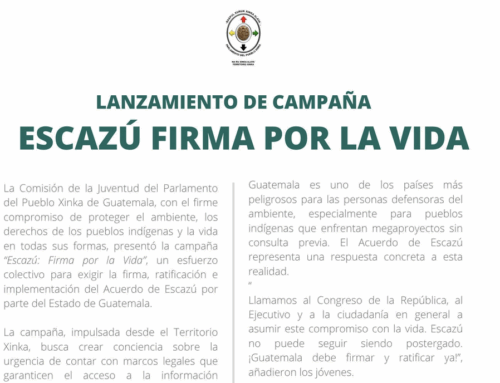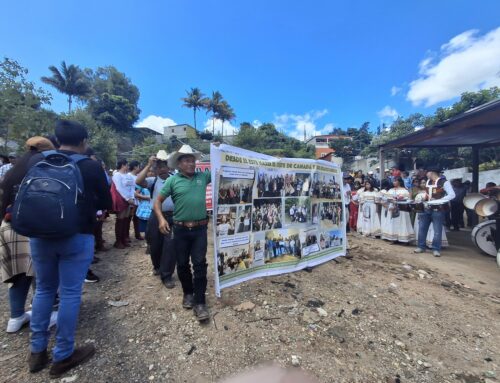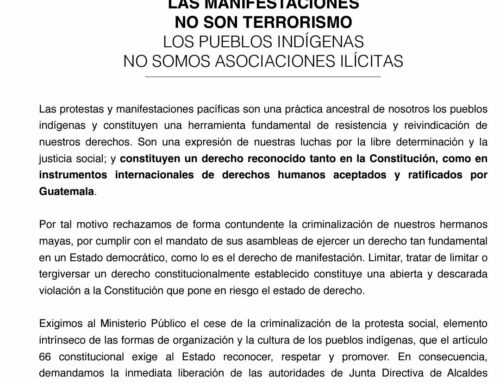Honorable: President Barack Obama, President Otto Pérez Molina President Juan Orlando Hernández President Salvador Sánchez Cerén, President Enrique Peña Nieto
We, the undersigned civil society organizations and groups, wish to address you as your meetings begin at the Summit of the Americas in Panama to express our urgent concerns about the Plan of the Alliance for Prosperity of the Northern Triangle.
For years, civil society organizations in our countries and other allied nations have been sounding the alarm regarding the dire human rights crisis in Central America and Mexico. The militarization of citizen security has contributed to systematic human rights abuses while harmful, private- and foreign-investor-led “development” policies continue to dispossess communities of their lands and livelihoods. The result of these policies, among others, is forced migration, the impact of which differs based on social conditions, including gender, ethnicity and ability. Migrants continue to be criminalized, which heightens the grave risk to their lives, physical safety and human dignity. Migration that occurs under these conditions continues to divide families and increase human suffering in the region.
While we welcome the commitments from the governments of countries known as the Northern Triangle to jointly address this regional crisis, we fear the Alliance for Prosperity will only exacerbate the very conditions of poverty and violence they claim to address.
Our deepest concern is that the Plan reinforces the same economic policies that have resulted in skyrocketing inequality, widespread abuse of workers’ rights and increased violence against labor leaders, and forced displacement throughout Mesoamerica. We are especially alarmed by the proposed construction of large-scale extractive, hydroelectric or infrastructure projects in marginalized communities, particularly because of the notable absence of any democratic processes to ensure free, prior and informed consent of the affected populations.
Furthermore, the Plan perpetuates the same militarized security policies that have become synonymous with the horrors of the Drug War. Many of our organizations are witness to and have suffered from the systematic human rights abuses carried out by police and military. It is essential that any proposed solution to the violence in our region center on ending corruption and impunity, especially when it occurs at the highest levels, and on the de-militarization our security forces.
Finally, the Plan’s proposal to militarize our regional borders not only risks violating the human right to free transit and the rights of refugees fleeing violence, but also is likely to lead to increases in many forms of abuse towards migrants in Central America, Mexico and the United States. Therefore, we call on the governments of the region to end, and on the international community to remain alert to, the criminalization and deportation of migrants, to initiate a thorough process of revising migration policy that’s currently based on a security framework to one based on human rights, to investigate and prosecute crimes and abuses this population that are committed in various countries during the different periods of migration, when forced to leave, during transit and upon return, and to improve and expedite refugee services in all of our countries, most especially in the United States.
We believe it is critical that it be made known at the Summit of the Americas that there was no process of democratic consultation during the development of the Plan of the Alliance for Prosperity and that our organizations – which represent a diverse cross-section of the human rights, migrant justice, labor, indigenous, faith-based, women’s, agricultural, and environmental movements in our countries – were not consulted either. The Plan was developed behind closed doors by the governments of El Salvador, Guatemala, Honduras, and international financial institutions like the Inter-American Development Bank, with support from the United States. We understand that limited civil society consultation is underway now, though we are not aware with whom, though several agreements have already been signed.
Therefore, we call for robust, participatory and democratic processes of consultation with the population to be carried out before moving forward. This is the only way to ensure that regional co-operation among our governments will serve to redress, rather than exacerbate, the urgent needs of the citizens of Central America.
Signed by:
El Salvador
Centro de Investigaciones sobre Inversión y Comercio (CEICOM)
Confederación de Unidad de Trabajadoras y Trabajadores de El Salvador (CONFUERSA) Federación de Asociaciones o Sindicatos Independientes de El Salvador (FEASIES) Federación de Sindicatos de Instituciones Públicas y Autónomas de El Salvador (FESIPAES) Federación de Unidad de Trabajadoras y Trabajadores de El Salvador (FUERSA)
Federación Sindical de Trabajadores Municipales de El Salvador (FESITRAM)
Frente Social y Sindical Salvadoreño
Fundación de Estudios para la Aplicación del Derecho (FESPAD)
Fundación Salvadoreña para el Desarrollo Local y la Democracia (FUNDASPAD) Movimiento Popular de Resistencia 12 de Octubre (MPR-12)
Guatemala
Asociación de Mujeres Indígenas Xincas de Santa María Xalapán, Jalapa (AMISMAXAJ) Asociación Verdad y Justicia (AVEJA)
Centro de Acción Legal en Derechos Humanos (CALDH)
Centro de Acción Legal-Ambiental y Social de Guatemala (CALAS)
Colectiva Actoras de Cambio
Centro de Análisis Forense y Ciencias Aplicadas (CAFCA)
Colectivo MadreSelva
Comité Campesino del Altiplano (CCDA)
Consejo de Pueblos K’iche’s, por la Defensa de la Vida, la Madre Naturaleza la Tierra y Territorio
Equipo de Estudios Comunitarios y Acción Psicosocial (ECAP)
Instituto Centroamericano de Estudios Fiscales (ICEFI)
Movimiento de Mujeres Mayas por la Verdad y la Justicia
Oficina de Derechos Humanos del Arzobispado de Guatemala (ODHAG)
Plataforma 51, Guatemala
Salva la Selva
Prensa Comunitaria
Seguridad en Democracia (SEDEM)
The Forum of International NGOs in Guatemala (FONGI)
Unidad de Protección a Defensoras y Defensores de Derechos Humanos de Guatemala (UDEFEGUA) Unión Nacional de Mujeres Guatemaltecas UNAMG
Honduras
Centro de Derechos de Mujeres, Honduras
Comité de las Familias de Desaparecidos y Detenidos en Honduras (COFADEH) Mesoamericanas por una Vida Digna/Honduras
Mujeres en Resistencia por una Vida Digna
United States
Alliance for Global Justice
American Jewish World Service
Chicago Religious Leadership Network (CRLN)
CIP Americas Program
Committee in Solidarity with the People of El Salvador (CISPES)
Codepink
Farmworker Association of Florida
Fellowship of Reconciliation
Florida Immigrant Coalition
Friendship Office of the Americas
Guatemala Human Rights Commission (GHRC)
Haitian Women of Miami (FANM)
Honduras Solidarity Network
Human Rights Alliance for Child Refugees & Families
JASS (Just Associates)
Juventud FMLN Sur de California
Marin Task Force on the Americas
Maryknoll Office for Global Concerns
Mennonite Central Committee U.S. Washington Office
National Association of Salvadoran Professionals
Network in Solidarity with the People of Guatemala (NISGUA) Nicaragua Network
Palm Beach County Coalition for Immigrant Rights (PBCCIR) Portland Central America Solidarity Committee (PCASC)
Santa Elena Project of Accompaniment (SEPA)
School of the Americas Watch
Sisters of Mercy of the Americas – Institute Justice Team The Missionary Servants of the Most Holy Trinity
US El Salvador Sister Cities
Voices on the Border
WeCount!
Wyoming Guatemala Accompaniment Project (WYGAP)
Argentina: Comisión Jacobo Arbenz en Argentina; Canada: Maritimes-Guatemala Breaking the Silence Network; Colombia: Fondo de Acción Urgente América Latina; Costa Rica: Alianza de Mujeres Costarricense, Centro de Amigos para la Paz, Mesoamericanas en Resistencia por una Vida Digna/Costa Rica; Mexico: Servicios para una Educación Alternativa A.C.; Panama: Espacio de Encuentro/Panamá, Colectivo Voces Ecológicas (COVEC) de Panamá; Spain: Asociación de Mujeres de Guatemala (AMG)






Leave A Comment